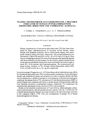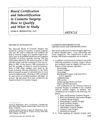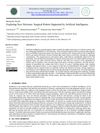 10 citations,
August 2012 in “Clinical Pharmacokinectics”
10 citations,
August 2012 in “Clinical Pharmacokinectics” Type 2 diabetes does not change how metformin works in obese pregnant women, so dosage adjustments are not needed.
 7 citations,
March 2017 in “Medical Hypotheses”
7 citations,
March 2017 in “Medical Hypotheses” Aquaporins could be new drug targets for treating polycystic ovary syndrome.
 6 citations,
June 2017 in “Reproductive Biomedicine Online”
6 citations,
June 2017 in “Reproductive Biomedicine Online” Chinese women with PCOS have higher androgen levels, which change with age and weight.
 6 citations,
November 1980 in “Clinical Endocrinology”
6 citations,
November 1980 in “Clinical Endocrinology” Measuring plasma testosterone glucosiduronate is a reliable way to detect high male hormone levels in women.
 1 citations,
February 2022 in “Case reports in endocrinology”
1 citations,
February 2022 in “Case reports in endocrinology” An unusual growth of Leydig cells in a woman's ovaries caused her excessive hair growth, which was treated successfully with surgery.
 1 citations,
December 1989 in “The Journal of Dermatologic Surgery and Oncology”
1 citations,
December 1989 in “The Journal of Dermatologic Surgery and Oncology” To get certified in cosmetic surgery, doctors must pass exams and have specific experience; dermatologists are encouraged to get certified.

AI-assisted surgical robots improve surgery precision and safety.
 January 2022 in “Acta Scientific Women's Health”
January 2022 in “Acta Scientific Women's Health” Early diagnosis and treatment of PCOS can prevent complications and improve symptoms.
 February 2021 in “PARIPEX INDIAN JOURNAL OF RESEARCH”
February 2021 in “PARIPEX INDIAN JOURNAL OF RESEARCH” Women with PCOS, especially if they are obese, are more likely to have an underactive thyroid than women without PCOS.
November 2014 in “PharmaTutor” Finasteride may help postmenopausal women with hair loss but is not effective for all and should be used cautiously in premenopausal women.
 198 citations,
July 2011 in “Cochrane library”
198 citations,
July 2011 in “Cochrane library” Lifestyle changes can improve body composition, excess male hormone levels, and insulin resistance in women with PCOS.
 157 citations,
April 1994 in “Clinical endocrinology”
157 citations,
April 1994 in “Clinical endocrinology” Androgens can cause hair growth in some areas and hair loss on the scalp.
 142 citations,
January 2019 in “Frontiers in Neuroendocrinology”
142 citations,
January 2019 in “Frontiers in Neuroendocrinology” Postpartum depression is linked to changes in brain chemicals, inflammation, stress, and certain genes, and can potentially be identified by markers like specific steroids, serotonin levels, and vitamin D levels.
 131 citations,
August 2004 in “Best Practice & Research in Clinical Obstetrics & Gynaecology”
131 citations,
August 2004 in “Best Practice & Research in Clinical Obstetrics & Gynaecology” The conclusion is that PCOS is caused by ovarian sensitivity to hormones and disrupted hormone control, possibly due to ovarian factors, and more research is needed.
 124 citations,
June 2002 in “Best Practice & Research Clinical Endocrinology & Metabolism”
124 citations,
June 2002 in “Best Practice & Research Clinical Endocrinology & Metabolism” Polycystic Ovary Syndrome likely starts in childhood and may be genetic and influenced by early hormone exposure.
 111 citations,
November 2010 in “Human Reproduction”
111 citations,
November 2010 in “Human Reproduction” South Asian women with PCOS are more likely to have metabolic issues and central obesity, and simple measures like waist size and blood pressure can help identify these risks early.
 88 citations,
May 2012 in “Human Reproduction Update”
88 citations,
May 2012 in “Human Reproduction Update” Women with PCOS may take longer to get pregnant but can have a normal family size, and should manage their overall health to reduce long-term health risks.
 69 citations,
November 2010 in “Middle East Fertility Society Journal”
69 citations,
November 2010 in “Middle East Fertility Society Journal” PCOS affects women's health by increasing the risk of diabetes, heart disease, and reproductive issues.
 64 citations,
May 2003 in “Journal of health psychology”
64 citations,
May 2003 in “Journal of health psychology” Women with excess body hair feel psychological distress influenced by societal beauty standards, but distress isn't directly linked to the amount of hair.
 54 citations,
April 2010 in “Baillière's best practice and research in clinical endocrinology and metabolism/Baillière's best practice & research. Clinical endocrinology & metabolism”
54 citations,
April 2010 in “Baillière's best practice and research in clinical endocrinology and metabolism/Baillière's best practice & research. Clinical endocrinology & metabolism” Impaired androgen production in 46,XY DSDs causes ambiguous genitalia and requires long-term care.
 35 citations,
May 2012 in “Cochrane Database of Systematic Reviews”
35 citations,
May 2012 in “Cochrane Database of Systematic Reviews” Minoxidil effectively treats female pattern hair loss.
 32 citations,
October 2003
32 citations,
October 2003 Spironolactone is better than placebo for reducing excessive hair growth in women, but its effectiveness for acne is unclear due to small study sizes.
 31 citations,
January 2014 in “Clinical Endocrinology”
31 citations,
January 2014 in “Clinical Endocrinology” The study suggests that being overweight or obese, not PCOS itself, is strongly linked to insulin resistance.
 30 citations,
March 2015 in “Clinical Endocrinology”
30 citations,
March 2015 in “Clinical Endocrinology” Young women with high male hormone levels or PCOS often feel more psychological distress and have a lower quality of life.
 28 citations,
October 1998 in “Baillière's clinical endocrinology and metabolism”
28 citations,
October 1998 in “Baillière's clinical endocrinology and metabolism” Testosterone replacement may help post-menopausal women with androgen insufficiency, but more research is needed on its benefits and risks.
 27 citations,
April 1996 in “Baillière's clinical endocrinology and metabolism”
27 citations,
April 1996 in “Baillière's clinical endocrinology and metabolism” The document says that understanding the causes of PCOS is important for treatment, especially in distinguishing the syndrome from just having cystic ovaries, and that losing weight is key for obese women with PCOS.
 26 citations,
January 2013 in “BioMed Research International”
26 citations,
January 2013 in “BioMed Research International” Hormonal changes after childbirth and menopause can lead to women's hair loss and facial hair growth, with a need for better treatments.
 24 citations,
March 2002 in “Expert opinion on investigational drugs”
24 citations,
March 2002 in “Expert opinion on investigational drugs” Different anti-androgen medications can help treat excessive hair growth, but the right choice depends on accurate diagnosis.
 21 citations,
May 2016 in “The Cochrane library”
21 citations,
May 2016 in “The Cochrane library” Topical minoxidil helps treat female pattern hair loss, but more research needed for other treatments.
 18 citations,
September 2015 in “Clinical Endocrinology”
18 citations,
September 2015 in “Clinical Endocrinology” Women with PCOS have higher levels of a certain growth factor, which can be reduced by taking metformin.





























